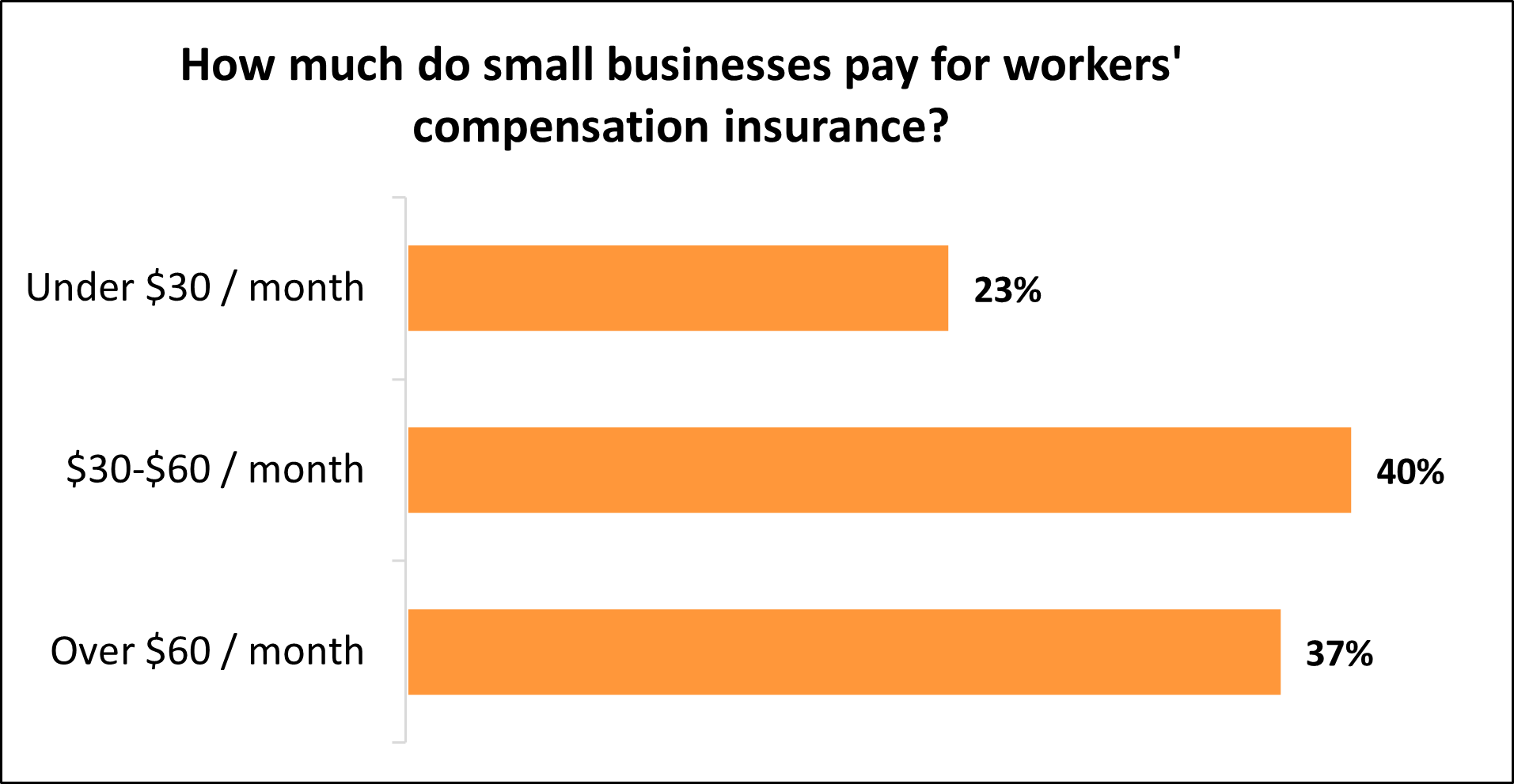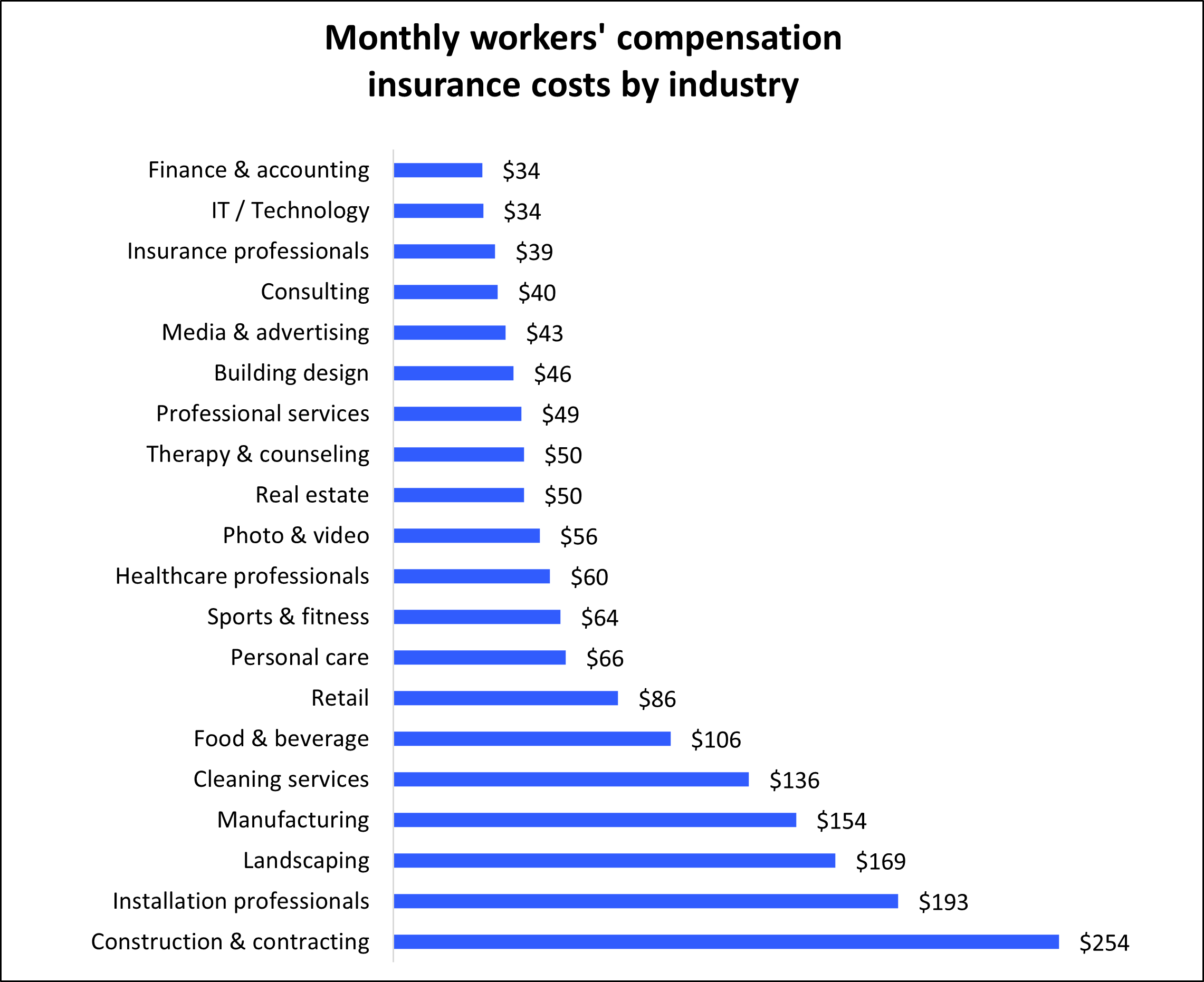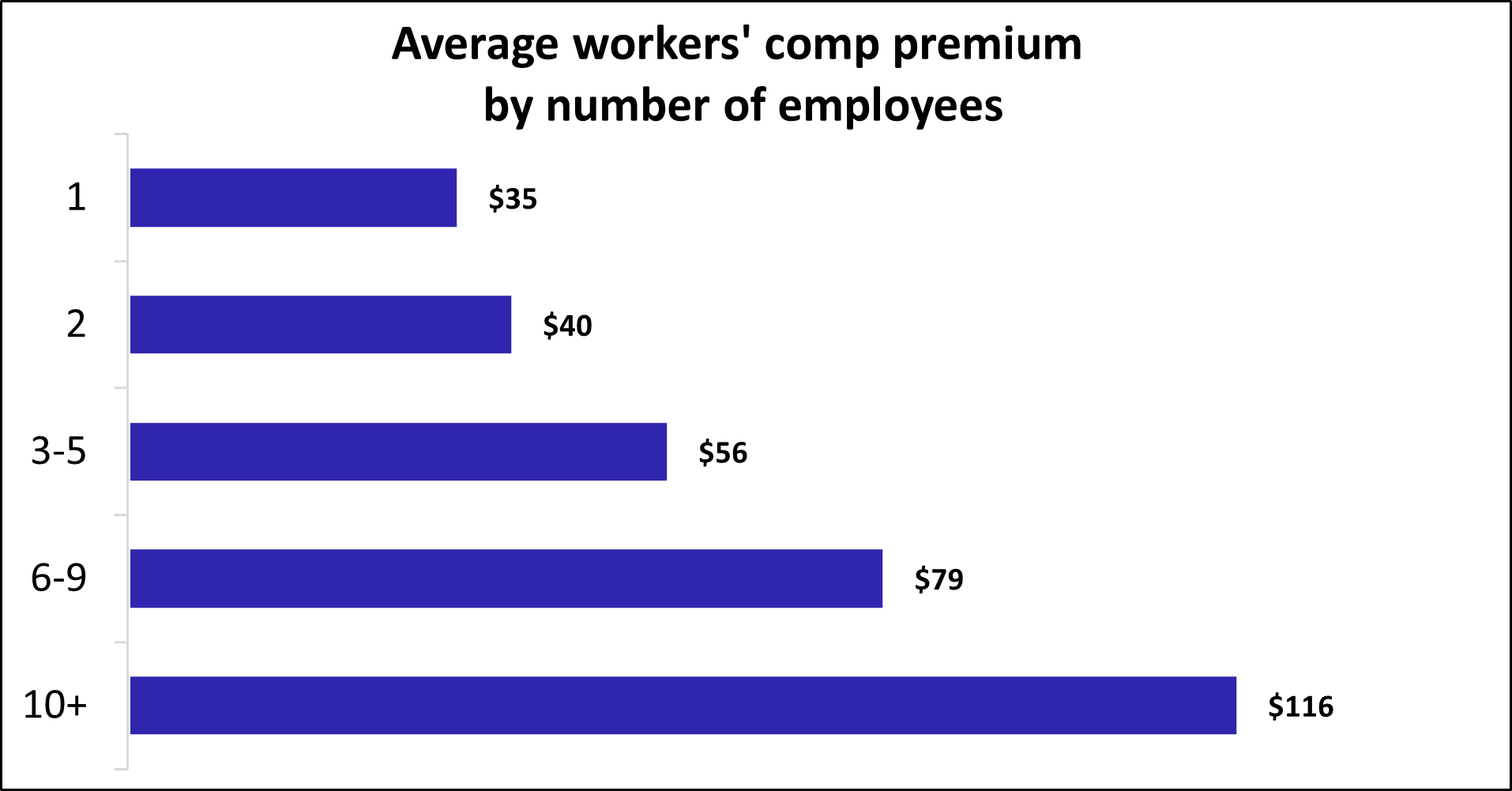
Workers' compensation insurance cost
The cost of workers' compensation insurance depends on several factors specific to your business. Your premium is affected by your business location, the number of employees you have, industry risks, and more.
What is the average cost of workers' comp insurance for small businesses?
Small businesses pay an average of $54 per month, or $643 annually, for workers' compensation insurance. Annual premiums range from under $300 to over $5,000 per year.
Our figures are calculated using the median cost of policies sold by leading insurance companies to Insureon's small business customers. The median offers a better estimate of what your business is likely to pay because it excludes high and low premium outliers, like high-risk installation businesses that pay much more for workers’ compensation.
The average workers' compensation claim is almost $50,000, according to the National Safety Council. It's better to invest in a workers' compensation policy that covers medical expenses, disability benefits, death benefits, and other costs related to a workplace injury.
Self-employed individuals can choose to purchase workers' comp to protect against work-related medical bills and lost wages that personal health insurance won't cover. The premium depends on the number of employees you have and their risk of a workplace injury, which makes this an inexpensive policy for businesses that only have a few employees.
How much does workers' compensation insurance cost for Insureon customers?
Insureon's small business customers pay an average of $54 monthly for workers’ compensation coverage, with 23% of our customers paying less than $30 per month and 40% paying between $30 and $60 per month.
Annual premiums range widely from under $300 to over $5,000.
The cost depends on your type of business, its location, your claims history, and the number of employees you have.


Your workers' compensation insurance premium will depend on the following factors:
- The state(s) where your employees work
- Your total annual payroll
- Your industry
- Your workers' comp claims history
- The number of employees you have
- The type of work done by your employees
- Policy limits
Physically demanding work usually results in higher premiums—so does a history of workplace accidents. Small businesses with low risks and few employees can expect lower workers' comp insurance costs.
Business location
The state where your employees work can have a big impact on how much you pay for workers' compensation. Each state has its own workers' compensation laws and its own rating bureau that sets the baseline for workers' comp premiums.
Some states run their own insurance funds that sell workers' comp coverage. In the four monopolistic states (North Dakota, Ohio, Washington, and Wyoming), businesses are required to buy workers' comp policies, sometimes called industrial insurance, from the state fund.
Most states require businesses that have employees to purchase workers' comp. Similarly, state requirements typically mandate commercial auto insurance for any vehicles owned by a business.
Below are some examples of average workers' compensation insurance costs across different states for Insureon policyholders:
| State | Workers' comp insurance cost |
|---|---|
$46 per month | |
$62 per month | |
$45 per month | |
$43 per month | |
$32 per month | |
$46 per month | |
$38 per month | |
$29 per month | |
$32 per month | |
$42 per month |
Workers' compensation laws in your state

Annual payroll
Workers’ compensation insurance rates depend on your total payroll because it reflects how many employees you have. More employees means greater exposure to potential injuries on the job or occupational illnesses.
Insurers apply a rate—usually expressed as a dollar amount per $100 of payroll—based on your industry classification. That means the more you pay your employees in total, the more your premium will cost.
Keeping your payroll records accurate and up to date is essential, especially since premiums are often audited at the end of the policy term to ensure you're charged the correct amount.
Industry
About a fifth of worker fatalities in private industry occur in construction. Construction companies pay more for insurance to compensate for the higher risk of accidents. That's especially true in dangerous professions like roofing, where injuries often result in expensive treatment or a prolonged time before the employee can return to work.
On the other hand, low-risk industries centered around office work pay less expensive premiums, because there’s minimal risk of a work-related injury. Insureon's finance and accounting customers pay a monthly average of $34, while construction and contracting businesses pay an average of $254 per month.
Depending on your industry, such as construction or food service, local laws might require you to carry general liability insurance. For other businesses, such as those in real estate, insurance, or healthcare, you may need professional liability insurance (also called errors and omissions insurance or E&O) before you can get a license.
Below is the average cost of workers' compensation coverage across different industries:

Top industries we insure
Claims history
Your business’s history of workers’ comp claims plays a major role in your insurance costs, even though it's a no-fault policy. If you've had multiple claims, or one very expensive claim, insurers may consider your workplace high-risk. This can lead to higher rates, surcharges, or difficulty finding coverage.
On the other hand, a clean claims history is a strong signal your business prioritizes safety and risk management. Many insurance companies reward lower-risk businesses with lower premiums, discounts, or eligibility for dividend or group rating programs.
Investing in workplace safety programs, maintaining proper equipment, and responding quickly to hazards can help prevent injuries and subsequent claims, and keep your insurance costs in check over the long term.
Number of employees
Businesses with a larger number of employees—including full-time workers, part-time workers, and contractors—pay more for workers’ comp. As your business grows, the odds that one of your employees could get injured at work go up, and so do your workers’ compensation rates.
For example, Insureon customers with three to five employees pay an average of $56 per month, while businesses with 10 or more employees pay $116 per month.

The amount you pay for workers’ compensation is a specific rate for every $100 of your company’s total payroll, also called the net rate. Your workers' comp premium is calculated based on the type of work done by your employees (classification rate), your experience modification rating or EMR (claims history), and your payroll (per $100).
Workers' compensation insurance rates vary by state, ranging from a low monthly average of $32 in Texas to $119 in Alabama. However, these numbers are deceptively simple. They include all types of jobs, which means they don't reflect the different workers’ comp costs for low-risk versus high-risk work.
The formula for calculating a workers' comp premium is: Classification rate x Experience modification rate x (Annual payroll / $100).

Many states set their workers’ comp rates based on guidance from the National Council on Compensation Insurance (NCCI), a workers' compensation insurance rating and data collection bureau. The NCCI analyzes trends and makes recommendations based on data from millions of claims and policies. It also has information on how workers' compensation insurance premiums are calculated in many states.
The NCCI has a searchable database of workers’ comp class codes online. Insurance companies use these classification codes to determine the level of risk for different job classifications, estimate workers' compensation rates, and set premiums.
How can you save money on workers' comp?
Though you can't change your industry or the type of work your employees do, there are steps you can take to keep your workers' comp premium low.
Remember, going without insurance could cost you more in the long run. Workers' comp coverage shields you from medical bills and lost wages, and can help you land contracts with clients. You could also face fines and other penalties if you're uninsured when it's required.
Here are a few strategies to help you reduce your workers' comp costs and avoid more expensive rates:
Improve workplace safety
To create a safer work environment and reduce the risk of work-related injuries, you can:
- Conduct employee training: Train employees in how to safely do their jobs, from proper lifting techniques to correct handling of hazardous materials.
- Outfit your employees with the right gear: Equip employees with safety equipment and properly maintain tools to help minimize risks.
- Identify any potential hazards: Use signs and labels to alert workers of potential safety issues, such as dangerous chemicals or slippery floors.
- Create a clutter-free workplace: Hallways, work areas, and exit routes should be free of debris and clutter like power cords and boxes to avoid tripping hazards.
When you purchase a workers’ compensation insurance policy, you have the option of paying your premium monthly or annually. Though it's tempting to pay the smaller monthly premiums, many insurers offer discounts when you pay the full annual amount.
Get a "pay-as-you-go" insurance policy
For some small businesses, it may be more cost effective to get a pay-as-you-go workers' comp policy. Contrary to guaranteed cost coverage, this type of policy offers flexible premiums that change throughout the year, depending on changes to your number of employees and your payroll data throughout a 12-month span.
Small businesses with low risks and few employees are sometimes eligible for a minimum premium workers' compensation policy. This is a policy sold at the lowest possible amount while still covering the insurer's expenses.
If you only need coverage on paper, then you might consider a minimum premium policy called a workers' compensation ghost policy. A ghost policy does not provide any coverage in the event of an injury, but it can serve as proof of coverage in some circumstances.
If you're exempt from buying workers' comp, you can still protect yourself with occupational accident insurance (OAI). This cost-effective alternative to workers' comp provides coverage when an independent contractor or sole proprietor is injured on the job.
Prepare information for your insurance audit
Since it's normal for businesses to add and lose employees, your insurance carrier needs to make sure you have the right level of coverage for your business. Each year, your insurer will perform a workers’ comp insurance audit to confirm your workers' comp covers what it needs to without paying more.
Your insurance company uses this audit to adjust your premium for the previous policy term based on your actual payroll to make sure you’re paying for all the coverage you need.
You can make the process for a workers’ comp audit a lot easier by being prepared. You should keep detailed and organized records that you can easily access for the auditor.
How do you buy workers’ compensation insurance?
In most states, you can purchase workers’ compensation insurance coverage from a private insurer. Though you could contact each provider separately, it's easier to work with an agent or broker who can do the work for you.
With Insureon, you can fill out an easy online application that retrieves quotes for workers' comp and other types of insurance from top-rated providers. We'll match you with companies that specialize in your profession's unique risks, and you can chat with an agent at any time in the process.
Get peace of mind knowing you have the best workers' comp coverage for your risks and your budget. Small business owners can typically get insured within a few hours of applying for quotes, and download a certificate of insurance the same day.
Verified workers' compensation insurance reviews
The average costs on this page were derived from our data on 40,000 small business owners who purchased policies through Insureon. Most of our customers have fewer than five employees, annual revenue ranging from less than $50,000 to more than $200,000, and have been in business for five years or less.
















